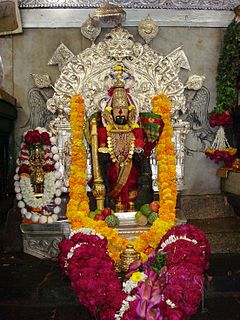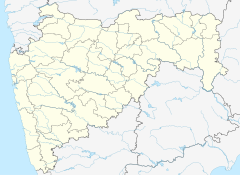Ambabai
| Shri Mahalakshmi of Kolhapur | |
|---|---|

Shri Mahalakshmi Idol in the garbgruha of the shrine
|
|
|
Location in Maharashtra
|
|
| Name | |
| Other names | आई अंबाबाई मंदिर |
| Proper name | Shri Mahalakshmi |
| Devanagari | श्री महालक्ष्मी देवस्थान |
| Kannada | ಶ್ರೀ ಮಹಾಲಕ್ಷ್ಮಿ |
| Tamil | ஸ்ரீ மகாலட்சுமி |
| Marathi |
श्री महालक्ष्मी (अंबाबाई) देवस्थान |
| Bengali | শ্রী মহালক্ষমি |
| Geography | |
| Coordinates | 16°42′00″N 74°14′00″E / 16.70000°N 74.23333°ECoordinates: 16°42′00″N 74°14′00″E / 16.70000°N 74.23333°E |
| Country | India |
| State/province | Maharashtra |
| District | Kolhapur |
| Locale | Mahadwar Road |
| Culture | |
| Primary deity | Vishnu mahaLakshmi |
| Important festivals | Navratri |
| History and governance | |
| Date built | 7th century |
श्री महालक्ष्मी
Timing for visit temple/Darshan - 04.00 am to 10.00 pm.
The Shri Mahalakshmi (AmbaBai) Temple of Kolhapur in Maharashtra, India, is one of the Shakti Peethas listed in various puranas of Hinduism. According to these writings, a Shakti Peetha is a place associated with Shakti, the goddess of power. The Kolhapur Shakti Peetha is of special religious significance being one of the six places where it is believed that one can either obtain salvation from desires or have them fulfilled. The temple takes its name from Mahalakshmi, the consort of Vishnu, and it is believed that the divine couple reside in the area.
The temple belongs architecturally to the Chalukya empire and was first built in the 7th century. Mounted on a stone platform, the image of the four armed and crowned goddess is made of gemstone and weighs about 40 kilograms. The image of Mahalakshmi carved in black stone is 3 feet in height. The Shri Yantra is carved on one of the walls in the temple. A stone lion, the vahana of the goddess, stands behind the statue. The crown contains an image of the Sheshnag — the serpent of Vishnu. In Her four hands, the deity of Mahalakshmi holds objects of symbolic value. The lower right hand holds a mhalunga (a citrus fruit), in the upper right, a large mace (kaumodaki) with its head touching the ground, in the upper left a shield (khetaka), and in the lower left, a bowl (panpatra). Unlike most Hindu sacred images, which face north or east, the image of this deity looks west (Pashchim). There is a small open window on the western wall, through which the light of the setting sun falls on the face of the image for three days around the 21st of each March and September. There are a number of other shrines in the courtyard to the Navagrahas, Surya, Mahishasuramardini, Vitthal-Rakhmai, Shiva, Vishnu, Tulja Bhavani and others. Some of these images date back to the 11th century, while some are of recent origin. Also located in the courtyard is the temple tank Manikarnika Kund, on whose bank is a shrine to Visweshwar Mahadev.
...
Wikipedia

